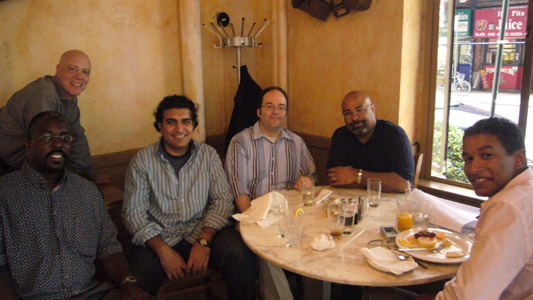|
|
By AL BERRIOS
 |
|
The
Big 4.
|
Every functioning thing in society today has a precedent, from governments to the way you get your coffee in the morning. So, if you believe that every incarnation of functional things in society today are improvements over what preceded it, it can be reasonable to say that belief in a single God (whether it be some omnipotent force, your preferred currency's purchasing power, or your favorite form of government) versus many gods is an improvement, too.
So, if monotheism is an improvement, what is it improving? This opinion proffers that the utility, and in fact, religion's ingenuity, is in society's inefficient and paralyzing debate on the truth of religion in general, when it would be a better to accept religion as a means to an end for those who improved it and ask, "What is the end?"
Religion is a "civilizing
influence": it was used by the slave traders of the fifteenth through
nineteenth centuries to justify what they did to Africans; it was used by
nineteenth century American landowners to help found cities in the west
(even today, some cities aren't considered "cities" without a
church [![]() 1]);
and, in the opinion of the consultants gathered at the recent Consultant
Entrepreneur's Forum on May 11, 2007, it's used today as a tool to manipulate
voters.
1]);
and, in the opinion of the consultants gathered at the recent Consultant
Entrepreneur's Forum on May 11, 2007, it's used today as a tool to manipulate
voters.
The original subject of the conversation was why the onus was on non-believers to take a stab at believing, but not on believers to take a chance and stop believing, so they could understand non-believers better. (I'm sure that at some point or another, we've all gotten into frustrating debates like this, where claiming to believe in something you don't really believe in can only be equated to being in the "closet" for fear of ostracizing.) The challenge with this thinking was evident in the discussion's attempt to bypass the subject of whether God really exists or if we're all "just pieces of animated meat", since that wasn't really relevant to understanding this obvious double-standard presented by anyone with faith in religion.
But once we accepted that we're not talking about religion's veracity, but its purpose, that we were able to understand the real meaning of "civilizing" and explore more thoroughly not so much the "good" delivered by religion, but who defined "good". For example, it was brought up in the discussion that the real purpose of nineteenth century Spanish missions across Latin America was to keep natives poor, barefoot and pregnant.
In a recent book, Pulitzer
prize-winning slavery scholar David Brion Davis isolates ideological justification
for enslaving "savage" Africans back to the "Curse of Ham"
(Noah's son. The curse was actually on Noah's grandson, Cana'an). Africans,
despite their superior hygiene and equivalent technology to Europeans at
the time were regarded as natural slaves for no other reason than their
dark skin, also a derivative of medieval association of black with evil.
Support for slavery was even presented as an opportunity to Christianize
Africans (![]() 2).
2).
 |
|
Standing:
Alan Metrick, Alan Metrick Communications; From left: Patrick Hardy,
P Hardy Technologies; Aankit Patel, Datran Media; Jed Aber, Max Profit
Centers; Francisco Acosta, Internal Business Consulting; Randolph
Hernandez, RandomSynergy.
|
From the Crusades to the Inquisition to witch hunting in New England, it's no secret that anything goes when it comes to religion. The real secret is why, despite its track record, religion is considered civilizing or how it continues to propagate itself. And in uncovering this secret, we realized it's not that big of a secret after all.
Religion, whether its belief systems are true or not, delivers onto its innovators power. Whether the innovator is interested in power is irrelevant. What's important is whether he wields this power with responsibility and who/what influences how he commands his religion's adherents. And because adherents aren't privy to all who influence their religious leaders, they're not privy to how and why they believe what they believe. (In this light, perhaps it may be easier for debaters to clarify that they're taking issue with the flow of information not the concept of religion.)
Religious-leader influencers, have, of course, corrected this gap in religion's functionality by dictating, simply, that a religious leader is, by definition, incorruptible and in actuality, not even a leader, but a vessel delivering a message from that all powerful being. The problem, obvious to this author, is that this still leaves a lot of room for interpretation by the vessel (not to mention flexibility of the actual identity of that "all powerful being"). And the claim about incorruptibility - three words: American Catholic priests. Here's two more: moral majority.
The recent passing of evangelical religious leader Jerry Falwell, founder of a movement referred to as the "moral majority", had long ago proved that the power granted to him by his adherents was quite potent. Whether or not the reader agrees on the moral majority's achievements under Mr. Falwell is irrelevant and pointless to debate; the fact remains that he mobilized religious adherents under his concept of morality and got politicians (including Reagan) into their coveted offices. (To repay his gratitude, Reagan gladly rebuilt the American military-industrial complex to aide in spreading American democracy inoculated with these new "morals".)
If America's current president, George Bush, is a born-again Christian, is he influenced by his citizens or a German pope in Rome? The reason John F. Kennedy's election to the presidency is so significant is precisely because he was (the first and still only) Irish Catholic in a country raised on even more conservative Protestant ideals and this same question came up then. (How many others, like Mr. Bush, have converted and to what remains a pretty big gap in how religion may continue its functionality for powerful religions-leader influencers.) Let's not forget America was colonized primarily to practice religion as colonizers saw fit. Commerce was indeed the driving force, but while not in Rome, no one wanted to do as they did.
So, why do adherents
permit themselves to be influenced by a device designed expressly to civilize
them, making them easier to govern (and if you don't want to accept what
our current government calls "administration") or manipulate?
(And while on that subject, are governments that restrict religion superior
to those that don't? After all, in the last generation, Communist China,
Russia and even Cuba have been involved in a total of just 2 altercations
with other sovereign nations, where as the U.S. alone has had over 10 altercations
where they were a primary aggressor, including Vietnam, Grenada, Panama,
Bosnia, Kosovo, Iraq 1, Afghanistan, Chechnya, Sudan, and Iraq 2 and that
doesn't include all of the covert altercations in the Persian Gulf, Latin
and Central America, and the Caribbean. [![]() 3])
3])
To start answering the question, it's important to ask what other tools exist to manipulate societies? We can count on vices such as drinking, smoking, drugs, entertainment like television, sports, and gambling, and yes, even employment and consumerism are helpful in making our behavior predictable enough to control.
Now, the reader should ask himself, what happens to the individual that doesn't partake in any of these vices? The reader may not know because he or she may not actually know anyone who doesn't consume any of these things. Thinking of religion in the same categories as these other consumables, if being an alcoholic isn't a desirable state to be in, or smoker, drug addict, TV junkie, gambler, corporate slave or in debt, why, then, is religious zealotry looked upon as desirable by society-at-large? (Your interest in ramming planes into buildings makes you no less dangerous than ramming politicians into office, so we're still talking the same kind of zealotry).
If you accept that
religious zealotry is possibly an undesirable state, (and no Torah, Bible,
or Qu'ran that you've read calls for light or moderate faith, does it?),
then it is entirely within the realm of possibility that religion is indeed
an ingenious device used to channel power for a purpose, and whosoever dictates
that purpose, controls those who adhere to those religions.
Footnotes
(1) "The World Goes to Town - Special Report on Cities", The Economist, May 5th 2007 - PDF
(2) Brion Davis, David, "Inhuman Bondage", Oxford University Press, 2006
(3) List of Wars: http://en.wikipedia.org/wiki/List_of_wars;
al berrios & co. analysis.
Al Berrios is Managing Director of al berrios & co., a pure strategy consulting firm, specializing in advising organizations + entrepreneurs on managing their enterprises in a service economy. Write or Subscribe to Consumer Strategies Report.
|
|